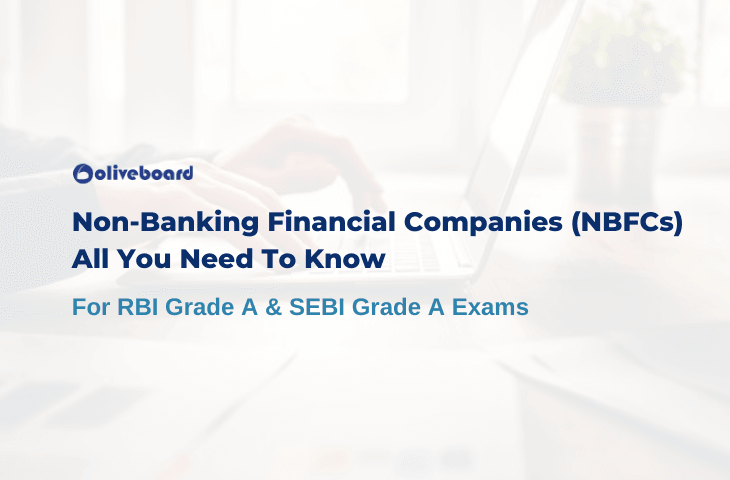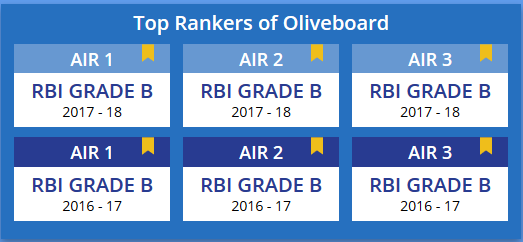Here is everything that you need to know about the Non-Banking Finance Companies (NBFC) for your exams of RBI Grade B & SEBI Grade A. Here the information is provided as per the FAQs given on the RBI website. Let us start with to know all about NBFCs.
Take a free Oliveboard Mock Test for RBI Grade B Prelims
Non-Banking Financial Companies: All You Need To Know
1. What is a Non-Banking Financial Company (NBFC)?
- A Non-Banking Financial Company (NBFC) is a company registered under the Companies Act, 1956 engaged in the business of loans and advances, acquisition of shares/stocks/bonds/debentures/securities issued by Government
- or local authority or other marketable securities of a like nature, leasing, hire-purchase, insurance business, chit business
- but does not include any institution whose principal business is that of agriculture activity, industrial activity, purchase or sale of any goods (other than securities) or providing any services and sale/purchase/construction of an immovable property.
- A non-banking institution which is a company and has principal business of receiving deposits under any scheme or arrangement in one lump sum or instalments by way of contributions or in any other manner is also a non-banking financial company (Residuary non-banking company).\\
2. What does conducting financial activity as “principal business” mean?
- Financial activity as the principal business is when a company’s financial assets constitute more than 50 per cent of the total assets and income from financial assets constitute more than 50 per cent of the gross income.
- A company which fulfils both these criteria will be registered as NBFC by RBI.
- The term ‘principal business’ is not defined by the Reserve Bank of India Act. The Reserve Bank has defined it to ensure that only companies predominantly engaged in financial activity get registered with it and are regulated and supervised by it.
- Hence if there are companies engaged in agricultural operations, industrial activity, purchase and sale of goods, providing services or purchase, sale or construction of immovable property as their principal business and are doing some financial business in a small way, they will not be regulated by the Reserve Bank.
- Interestingly, this test is popularly known as 50-50 test and is applied to determine whether or not a company is into financial business.
3. NBFCs are doing functions similar to banks.
What is the difference between banks & NBFCs?
NBFCs lend and make investments and hence their activities are akin to that of banks; however, there are a few differences as given below:
- NBFC cannot accept demand deposits;
- NBFCs do not form part of the payment and settlement system and cannot issue cheques drawn on itself;
- The deposit insurance facility of Deposit Insurance and Credit Guarantee Corporation is not available to depositors of NBFCs, unlike in case of banks.
4. Is it necessary that every NBFC should be registered with RBI?
In terms of Section 45-IA of the RBI Act, 1934, no Non-banking Financial company can commence or carry on the business of a non-banking financial institution without a) obtaining a certificate of registration from the Bank and without having a Net Owned Funds of ₹ 25 lakhs (₹ Two crores since April 1999).
However, in terms of the powers given to the Bank, to obviate dual regulation, certain categories of NBFCs which are regulated by other regulators are exempted from the requirement of registration with RBI viz.
- Venture Capital Fund/Merchant Banking companies/Stockbroking companies registered with SEBI,
- Insurance Company holding a valid Certificate of Registration issued by IRDA,
- Nidhi companies as notified under Section 620A of the Companies Act, 1956,
- Chit companies as defined in clause (b) of Section 2 of the Chit Funds Act, 1982,
- Housing Finance Companies regulated by National Housing Bank, Stock Exchange or a Mutual Benefit company. (as per the recent news HFCs are to be regulated by RBI).
5. What are the requirements for registration with RBI?
A company incorporated under the Companies Act, 1956 and desirous of commencing the business of non-banking financial institution as defined under Section 45 I(a) of the RBI Act, 1934 should comply with the following:
- It should be a company registered under Section 3 of the companies Act, 1956
- It should have a minimum net owned fund of ₹ 200 lakh. (The minimum net owned fund (NOF) required for specialized NBFCs like NBFC-MFIs, NBFC-Factors, CICs is indicated separately in the FAQs on specialized NBFCs).
6. What are systemically important NBFCs?
NBFCs whose asset size is of ₹ 500 cr or more as per last audited balance sheet are considered as systemically important NBFCs. The rationale for such classification is that the activities of such NBFCs will have a bearing on the financial stability of the overall economy.
7. Does the Reserve Bank regulate all financial companies?
No.
Merchant Banking Companies, Stock Exchanges, Companies engaged in the business of stock-broking/sub-broking, Venture Capital Fund Companies, Nidhi Companies, Insurance companies and Chit Fund Companies are NBFCs but they have been exempted from the requirement of registration under Section 45-IA of the RBI Act, 1934 subject to certain conditions.
Companies that do financial business but are regulated by other regulators are given specific exemption by the Reserve Bank from its regulatory requirements for avoiding duality of regulation.
It may also be mentioned that Mortgage Guarantee Companies have been notified as Non-Banking Financial Companies under Section 45 I(f)(iii) of the RBI Act, 1934. Core Investment Companies with an asset size of fewer than ₹ 100 crores and those with asset size of ₹ 100 crores and above but not accessing public funds are exempted from registration with the RBI.
8. What are the different types/categories of NBFCs registered with RBI?
NBFCs are categorized
a) In terms of the type of liabilities into Deposit and Non-Deposit accepting NBFCs,
b) non-deposit taking NBFCs by their size into systemically important and other non-deposit holding companies (NBFC-NDSI and NBFC-ND) and
c) by the kind of activity they conduct.
Within this broad categorization the different types of NBFCs are as follows:
I. Asset Finance Company (AFC):
- An AFC is a company which is a financial institution carrying on as its principal business the financing of physical assets supporting productive/economic activity, such as automobiles, tractors, lathe machines, generator sets, earthmoving and material handling equipment, moving on own power and general purpose industrial machines.
- Principal business for this purpose is defined as aggregate of financing real/physical assets supporting economic activity and income arising therefrom is not less than 60% of its total assets and total income respectively.
II. Investment Company (IC):
IC means any company which is a financial institution carrying on as its principal business the acquisition of securities,
III. Loan Company (LC):
LC means any company which is a financial institution carrying on as its principal business the providing of finance whether by making loans or advances or otherwise for any activity other than its own but does not include an Asset Finance Company.
IV. Infrastructure Finance Company (IFC):
IFC is a non-banking finance company a) which deploys at least 75 per cent of its total assets in infrastructure loans, b) has a minimum Net Owned Funds of ₹ 300 crores, c) has a minimum credit rating of ‘A ‘or equivalent d) and a CRAR of 15%.
V. Systemically Important Core Investment Company (CIC-ND-SI):
CIC-ND-SI is an NBFC carrying on the business of acquisition of shares and securities which satisfies the following conditions:-
(a) it holds not less than 90% of its Total Assets in the form of investment in equity shares, preference shares, debt or loans in group companies;
(b) its investments in the equity shares (including instruments compulsorily convertible into equity shares within a period not exceeding 10 years from the date of issue) in group companies constitutes not less than 60% of its Total Assets;
(c) it does not trade in its investments in shares, debt or loans in group companies except through block sale for dilution or disinvestment;
(d) it does not carry on any other financial activity referred to in Section 45I(c) and 45I(f) of the RBI act, 1934 except investment in bank deposits, money market instruments, government securities, loans to and investments in debt issuances of group companies or guarantees issued on behalf of group companies.
(e) Its asset size is ₹ 100 crore or above and
(f) It accepts public funds
VI. Infrastructure Debt Fund:
Non- Banking Financial Company (IDF-NBFC): IDF-NBFC is a company registered as NBFC to facilitate the flow of long term debt into infrastructure projects. IDF-NBFC raise resources through issue of Rupee or Dollar denominated bonds of minimum 5-year maturity. Only Infrastructure Finance Companies (IFC) can sponsor IDF-NBFCs.
VII. Non-Banking Financial Company: Micro Finance Institution (NBFC-MFI):
NBFC-MFI is a non-deposit taking NBFC having not less than 85% of its assets in the nature of qualifying assets which satisfy the following criteria:
a. loan disbursed by an NBFC-MFI to a borrower with a rural household annual income not exceeding ₹ 1,00,000 or urban and semi-urban household income not exceeding ₹ 1,60,000;
b. loan amount does not exceed ₹ 50,000 in the first cycle and ₹ 1,00,000 in subsequent cycles;
c. the total indebtedness of the borrower does not exceed ₹ 1,00,000;
d. tenure of the loan not to be less than 24 months for loan amount above ₹ 15,000 with prepayment without penalty;
e. loan to be extended without collateral;
f. aggregate amount of loans, given for income generation, is not less than 50 per cent of the total loans given by the MFIs;
g. the loan is repayable on weekly, fortnightly or monthly instalments at the choice of the borrower.
VIII. Non-Banking Financial Company – Factors (NBFC-Factors):
NBFC-Factor is a non-deposit taking NBFC engaged in the principal business of factoring. The financial assets in the factoring business should constitute at least 50 per cent of its total assets and its income derived from factoring business should not be less than 50 per cent of its gross income.
IX. Mortgage Guarantee Companies (MGC):
MGC are financial institutions for which at least 90% of the business turnover is mortgage guarantee business or at least 90% of the gross income is from mortgage guarantee business and the net owned fund is ₹ 100 crore.
X. NBFC- Non-Operative Financial Holding Company (NOFHC):
It is a financial institution through which promoter/promoter groups will be permitted to set up a new bank. It’s a wholly-owned Non-Operative Financial Holding Company (NOFHC) which will hold the bank as well as all other financial services companies regulated by RBI or other financial sector regulators, to the extent permissible under the applicable regulatory prescriptions.
9. What are the Residuary Non-Banking Companies (RNBCs)?
a) In what way it is different from other NBFCs?
- Residuary Non-Banking Company is a class of NBFC which is a company and has as its principal business the receiving of deposits, under any scheme or arrangement or in any other manner and not being Investment, Asset Financing, Loan Company.
- These companies are required to maintain investments as per directions of RBI, in addition to liquid assets.
- The functioning of these companies is different from those of NBFCs in terms of method of mobilization of deposits and requirement of deployment of depositors’ funds as per Directions. Besides, Prudential Norms Directions apply to these companies also.
b) We understand that there is no ceiling on raising of deposits by RNBCs, then how safe is deposit with them?
There is indeed no ceiling on raising of deposits by RNBCs. However, every RNBC has to ensure that the amounts deposited with it are fully invested in approved investments.
In other words, to secure the interests of the depositor, such companies are required to invest 100 per cent of their deposit liability into highly liquid and secure instruments, namely, Central/State Government securities, fixed deposits with scheduled commercial banks (SCB), Certificate of Deposits of SCB/FIs, units of Mutual Funds, etc.
c) Can RNBC forfeit deposit if deposit instalments are not paid regularly or discontinued?
No. Residuary Non-Banking Company cannot forfeit any amount deposited by the depositor, or any interest, premium, bonus or other advantage accrued thereon.
d) What is the rate of interest that an RNBC must pay on deposits and what should be maturity period of deposits taken by them?
- The minimum interest an RNBC should pay on deposits should be 5% (to be compounded annually) on the amount deposited in a lump sum or at monthly or longer intervals, and 3.5% (to be compounded annually) on the amount deposited under daily deposit scheme.
- The interest here includes premium, bonus or any other advantage, that an RNBC promises to the depositor by way of return.
- An RNBC can accept deposits for a minimum period of 12 months and a maximum period of 84 months from the date of receipt of such deposit. They cannot accept deposits repayable on demand.
- However, at present, the only RNBCs in existence (Peerless) has been directed by the Reserve Bank to stop collecting deposits, repay the deposits to the depositor and wind up their RNBC business as their business model is inherently unviable.
10. Does RBI guarantee the repayment of the deposits collected by NBFCs?
No.
The Reserve Bank does not guarantee repayment of deposits by NBFCs even though they may be authorized to collect deposits. As such, investors and depositors should take informed decisions while placing a deposit with an NBFC.
Source: FAQs given on the RBI website
Read about the NBFC Ombudsman Here
Study material for RBI Grade B 2020 by Oliveboard
Oliveboard’s RBI Grade B Online Course 2020 will be your one-stop destination for all your preparation needs
1. Course Details
RBI Grade B Cracker is designed to cover the complete syllabus for the 3 most important subjects: GA for Phase 1 and ESI + F&M for Phase 2 exam. Not just that, it also includes Mock Tests & Live Strategy Sessions for English, Quant & Reasoning for Phase 1. The course aims to complete your preparation in time for the release of the official notification.
1.1. Features:
| Phase I | Phase II |
|
|
1.2. How to enrol for the RBI Grade B Online Course 2020?
Step 1 – Login/Sign in RBI Grade B Exam Page.
Step 2 – After your login/sign in, click on “Edge (Live Class) on the top left corner.
Step 3 – As you click you will be redirected to the page where you would find the RBI Grade B Cracker Course 2020.
Now that you are aware of the RBI Grade B Online Classes, why wait?
Subscribe & Join the RBI Grade B 2020 Online Coaching here.

The most comprehensive online preparation portal for MBA, Banking and Government exams. Explore a range of mock tests and study material at www.oliveboard.in


